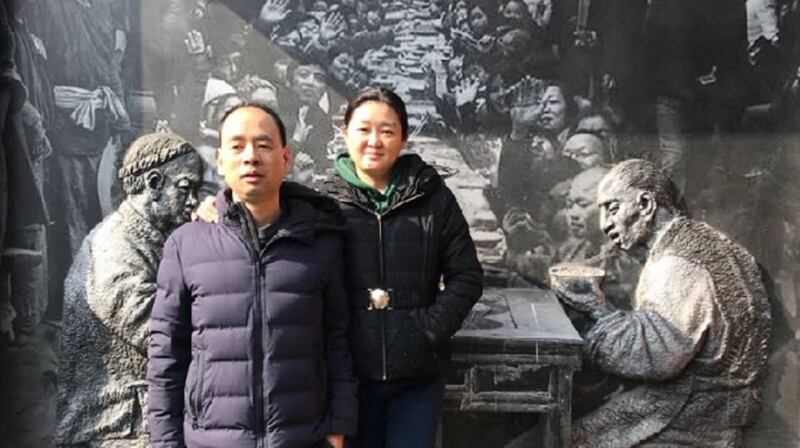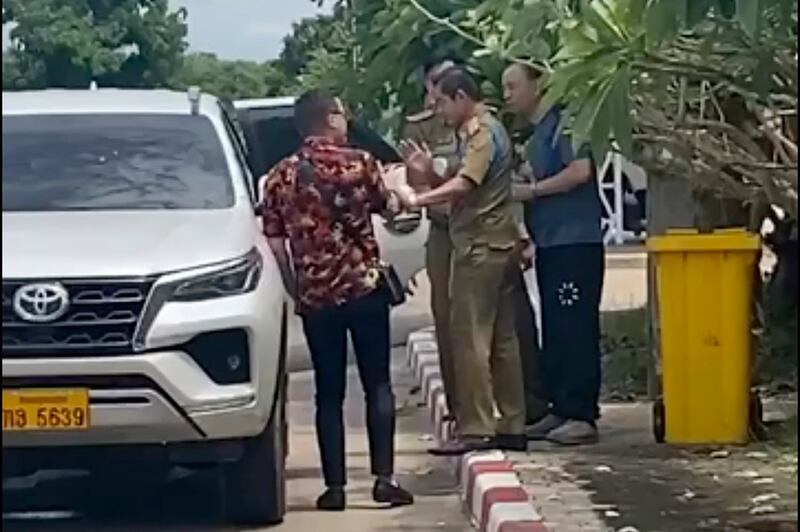Authorities in Laos told American and United Nations diplomats that detained Chinese rights attorney Lu Siwei was still in the country, even after he was sent back to face detention in China, his wife told Radio Free Asia in a recent interview.
Lu, who is now being held in the Xindu Detention Center in the southwestern Chinese province of Sichuan, was repatriated to China in early September after being arrested in Laos en route to join his family in the United States.
His detention in Laos and subsequent repatriation is another example of transnational "long-arm" law enforcement by Beijing, rights activists and commentators have warned.
Xindu Detention Center officials contacted his family on Oct. 4 informing them that he was being held there and requesting they send clothes, medication and money for him, but gave no details of his repatriation, nor of any criminal charges against him, his U.S.-based wife Zhang Chunxiao said.
Lu suffers from a severe skin condition and has been without his regular medication for two months now, she said.
Lu's lawyer confirmed on Sept. 14 that his client had left Laos for China several days earlier. Yet the authorities in Laos were still claiming that he was still in the country, Zhang said.

"The Ministry of Foreign Affairs of Laos kept telling the United Nations and American diplomats that Siwei was still in Laos," Zhang said. "What I really don't understand is how the Laos government would ... be willing to deceive everyone."
"[My husband] had already been sent back, and they were still saying that he was still in Laos. Why would they do that?"
The exact date of Lu's repatriation on a bus along with dozens of other wanted Chinese nationals remains unclear.
Laos ‘in debt’ to China
According to an official notification dated Sept. 11 issued by the Chinese Embassy in Laos to the Lao Ministry of Public Security, Lu was "approved for criminal detention" by police in the southwestern Chinese province of Sichuan on Sept. 3, on suspicion of "illegally crossing a border.”
The document, a copy of which was circulating on social media at the time, and which has now been proven genuine, informed the Lao authorities that the Ministry of Public Security of the People's Republic of China "requires that the suspect Lu Siwei be transferred to China, to be brought to justice as soon as possible."
Taiwanese democracy activist Lee Ming-cheh, who has served jail time in China for his activism, said the Lao authorities are clearly willing to do as Beijing tells them.
"Laos is in a great deal of debt to China under the Belt and Road [infrastructure] initiative," Lee said. "Laos' political system is also a dictatorship like China's, so it's pretty normal that Laos would send Lu Siwei back there."
It is unclear whether Lu will be allowed visitors, but could be denied visits from his family or lawyers if he is charged with a crime linked to "national security," like subversion, Lee said.

Zeng Jianyuan, chairman of the overseas-based New School for Democracy, agreed.
"Today just proves that Laos has succumbed to Chinese power," Zeng said. "It's a betrayal of ... the values respected in their society, which is Buddhist."
He said it was ironic that the news about Lu's fate is only emerging around the Oct. 1 anniversary of the founding of the People's Republic of China under late supreme leader Mao Zedong.
"They have arrested someone who really took practical action to achieve the revolutionary ideals of the Chinese Communist Party," Zeng said.
"Repatriating Lu Siwei was an act of betrayal, and it's very sad."
Translated by Luisetta Mudie. Edited by Malcolm Foster.
